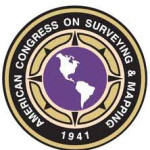- Industry: Earth science
- Number of terms: 93452
- Number of blossaries: 0
- Company Profile:
Founded in 1941, the American Congress on Surveying and Mapping (ACSM) is an international association representing the interests of professionals in surveying, mapping and communicating spatial data relating to the Earth's surface. Today, ACSM's members include more than 7,000 surveyors, ...
A coordinate system which is moving with respect to a fixed (inertial) coordinate system.
Industry:Earth science
(1) A horizontal angle measured from the prolongation of the preceding line, right or left to the following line. Only directed polygons, such as traverses, have deflection angles. (2) The angle, measured in that vertical plane containing the flight line, between the plane.
Industry:Earth science
A coordinate in a spheroidal coordinate system which is based on oblate ellipsoids of rotation. Oblate spheroidal coordinates (r, Ψ, θ, λ) are related to rectangular Cartesian coordinates (x, y, z) in a coordinate system having the same origin and axes by the equations:<br>
Industry:Earth science
A geodetic datum defined in terms of astronomic and geodetic quantities.
Industry:Earth science
A system by which control is labelled according to certain criteria that place control of like kinds under the same labels. The sets defined by the labeling are called categories. e.g., the kinds of control used in surveying are commonly placed in categories such as horizontal control, vertical control, photogrammetric control and gravity control. A separate classification places control in categories according to some arbitrary criterion for the accuracy or precision of that control; labels such as first-order, second-order class I and third-order. The U. S. A. has used various control classifications according as the number of different kinds of control or the attainable precision has increased, or as the organization of the surveying organization has changed. The most recent control-classification was promulgated in 1984.
Industry:Earth science
One of the two coordinates of a point in the Universal Polar Stereographic Grid System. The particular grid must be specified. That designation may be considered an additional coordinate.
Industry:Earth science
In surveying generally, the bearing (or azimuth) of a line, the length of a line or both. The term should not be used in describing control surveys, but if it is used, it should be with the inclusive meaning, azimuth and length of line. However, it is better to use azimuth and length of line as separate terms.
Industry:Earth science
A coordinate in any set used to specify the location or direction of a point on a celestial sphere.
Industry:Earth science
The least depth, in the approach or channel leading to a region such as a parort or anchorage, governing the greatest draft of the craft that can enter.
Industry:Earth science
One of a set of coordinates just sufficient for a unique characterization of the position of a mechanical system. The coordinates need no all be of one kind. One may be a distance, another an angle, a third a potential, etc.
Industry:Earth science
